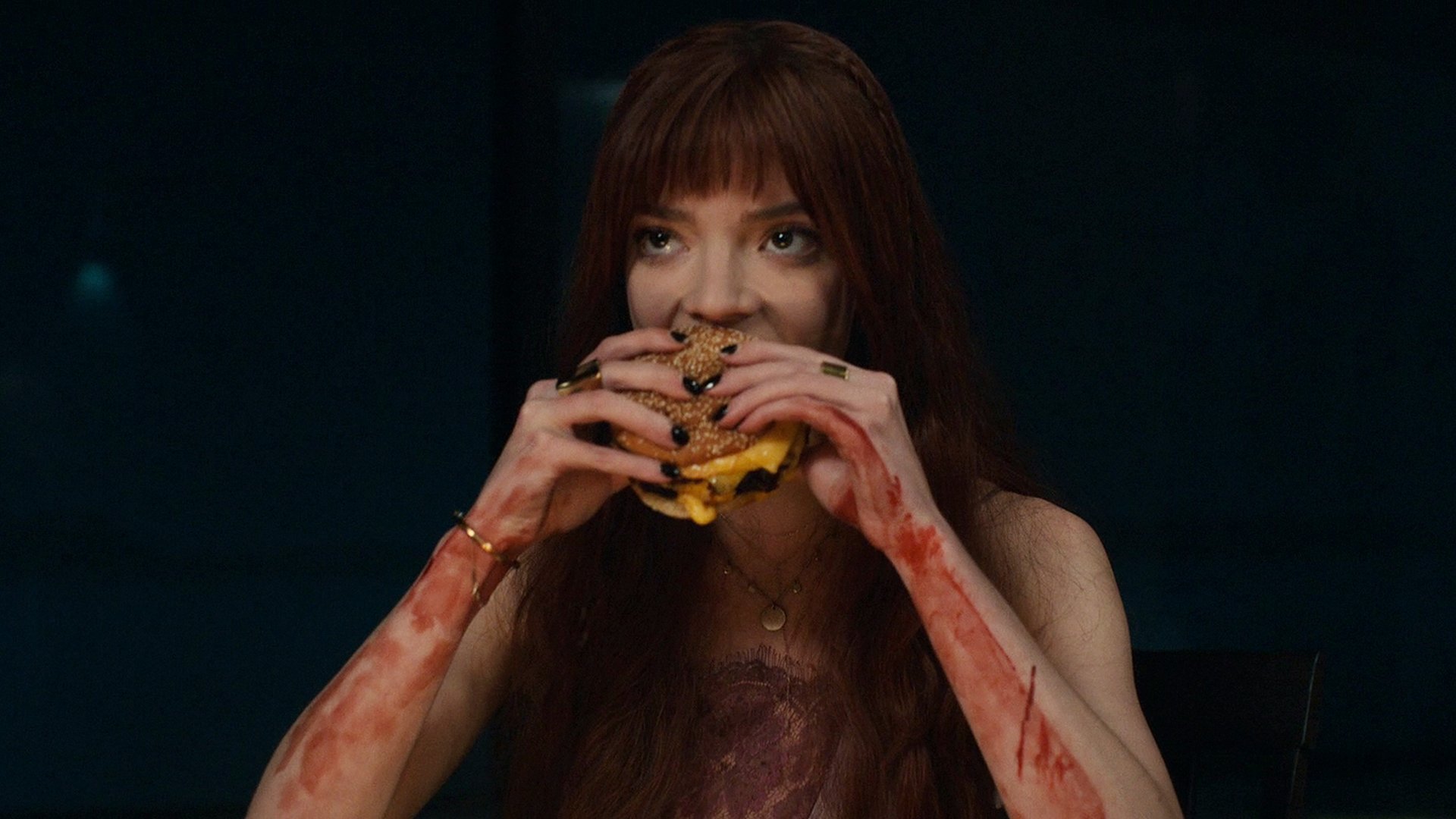What do high-budget blockbusters show us when they offer us the rich for delectation? Not a class, it would seem, but a species
How do you like your rich? Shrouded in a marshmallow mantle ready to be toasted, flamboyantly, alive? Or simply dressed, freshly caught and about to be bludgeoned with a rock? This past year a parade of ‘eat the rich’ films has served Anglo-American audiences a healthy selection of gastronomic styles through which to wreak revenge on money. While less literal than the class-inflected spectacles of actual cannibalism we saw in the era of The Texas Chainsaw Massacre (1974), the bloodthirsty attitudes of black comedies Triangle of Sadness (2022) and The Menu (2022) are still culinarily packaged and capital-critical in name.
Supply of this kind of cultural product would seem to follow current demand, at least on a superficial level. For weren’t the years of high pandemic a social-media feeding-frenzy for wealth-hating Gen Z? Weren’t influencers on the left and further-left staging threats to ‘vore’ the Forbes richlist and stab Jeff Bezos with forks? The haste with which producers served the people what they wanted has gifted us a flurry of fabulous scenes. Who wouldn’t delight, just a little, in witnessing the wealthy guzzled by those who have been eaten away by financial hardship? And yet, if we attend more closely to the influential burghers of TikTok, we will find this is not quite what they ordered.

“Bay-bee,” cooed activist YouTuber Kristina Maione in a viral video in 2021, “when we say ‘eat the rich’… it’s not because we’re jealous… We’re mad about the way that rich people exploit, use, abuse and manipulate the working class in order to gain that level of wealth. We’re not mad at David down the street with the big house… We’re mad about the unethical ways that people become billionaires.” It is hardly surprising, the same year that an Institute of Economic Affairs report found that 67 percent of young people in Britain wanted to live under socialism, that the generation most immiserated by capitalist dynamics would take issue with the mechanics of inordinate richness. It is sadly no more surprising that instead mainstream culture’s response should be to revert our attention to ‘David’ and his mansion.
What do high-budget blockbusters show us when they offer us the rich for delectation? Not a class, it would seem, but a species. Not the product of social processes, but an evolutionary fact. As the grisly carnival of luxury yachters in Triangle of Sadness are shown vomiting the contents of their greed across the keening ship, their captain, played by Woody Harrelson, disgorges the drunken wisdom that very few people see themselves as monsters, even if monsters they are. (As he speaks, a billionaire woman, slippery with her own sweat and vomit, flops across the toilet floor like a new-born seal pup. She hurls into the bowl with animal shrieks before an alien shade of brown begins to erupt from the overburdened drains.) Instead, he suggests, “they make up a construction that justifies what they do”, and what they do is determined by their ontological status as rich. United not by their stake in a system that produces inequality, but simply by their instinct for tax avoidance, these creatures’ only possible redemption is to be eaten in return. No wonder, when the yacht is shipwrecked and. the power of money dissolved, that the threat they will be mauled by disgruntled crew becomes the movie’s narrative propeller.

A similarly archetypal brood of odious snobs are the butt of The Menu’s joke. The film’s antagonist, Ralph Fiennes’s homicidal masterchef Julian Slowik, can at least admit his own monstrosity among them. Yet by subjecting his dinner guests to an evening of gastronomic gore, he believes he can cleanse himself of any such association. When his one rogue working-class dinner guest calls the cops on the maniacal cook, he declares her a species traitor – “an eater like the rest”.
The representation of rich and poor as eaters versus eaten is a deft ideological move. Its achievement, wrote John Berger in his 1976 essay ‘The Eaters and the Eaten’, is to suggest ‘that overproduction and infinite increase are natural’; to ‘prove the naturalness of wealth’. If movie cannibals were once portrayed as starving slaughterhouse workers feeding on the affluent youth, poverty is now reduced to an immovable condition, as with the ‘eaters’ in Luca Guadagnino’s cannibal romantic comedy Bones and All (2022). How does something so processual as class get reduced to biological breed? Perhaps we should take instruction from the human/animal class divide we already hold so dear. If I eat a pig, I render it other; if I render pigs other, it’s so that I might eat. ‘Generation Left’ has called for a radical critique of power – the power that others and brutalises pigs and pig-ifies the poor. Budget-holding directors invite us simply to make pigs of the rich instead.
Amber Husain, a writer based in London, is the author of two book-length essays, Meat Love (2023) and Replace Me (2021)
